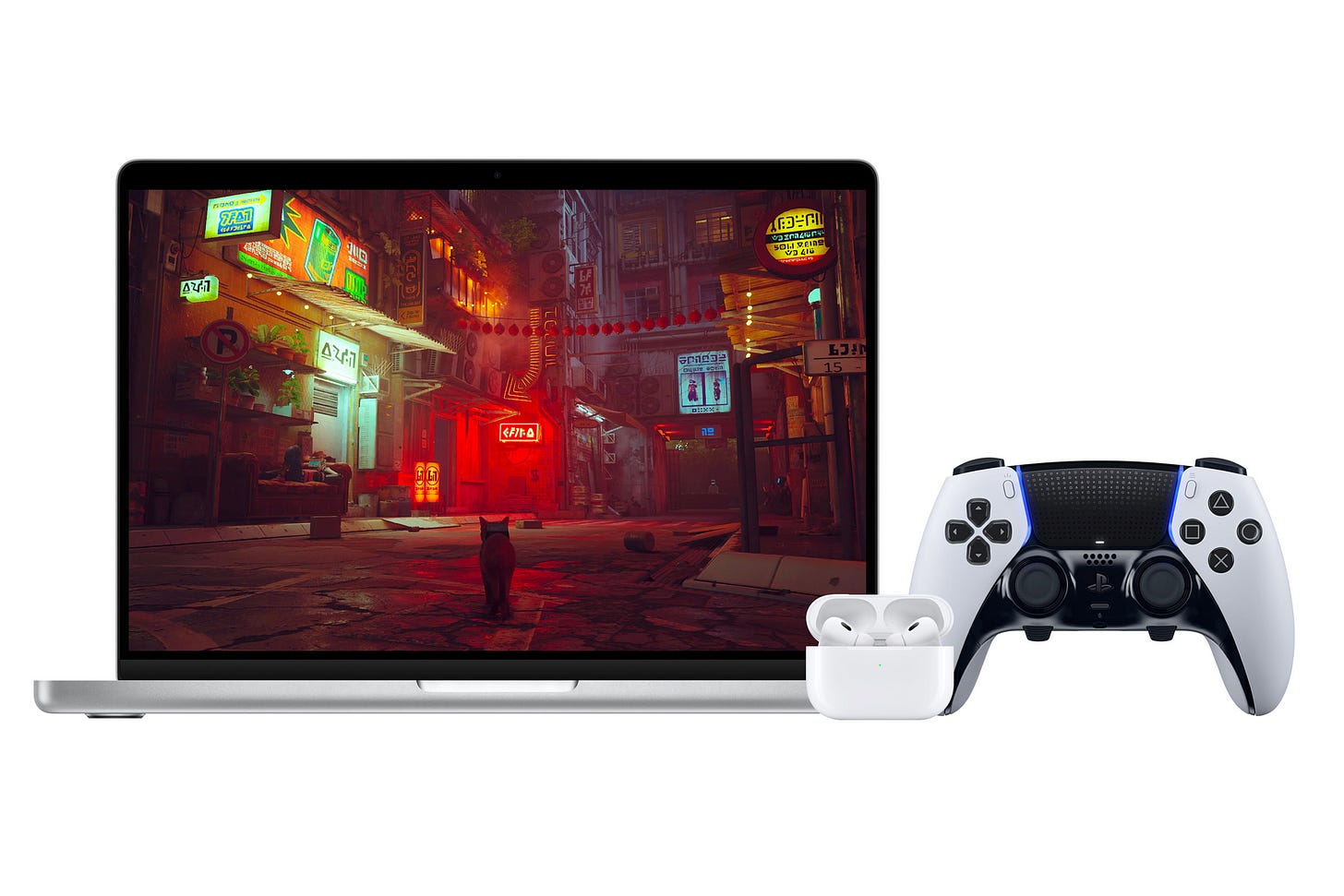Apple's gaming efforts risk running out of Steam
Helping with technical hurdles is only half the battle
Welcome back to Multicore for Thursday, June 15th.
To finally wrap up WWDC coverage, let's talk about Apple and gaming, a topic that has a somewhat fraught history. Here are some vaguely connected things that were announced last week:
Apple's WWDC keynote had a whole gaming segment in the Mac section, citing an "unprecedented opportunity" that the transition to Apple silicon provides for game developers.
The upcoming version of macOS, Sonoma, has a dedicated Game Mode that prioritises games' CPU and GPU usage over background tasks. It also reduces latency for wireless controllers and headphones.
Legendary game developer and Metal Gear Solid creator Hideo Kojima made an appearance to announce that his most recent title, Death Stranding, will come to the Mac App Store this year.
The upcoming Vision Pro headset will run more than 100 games from Apple Arcade, with that version of NBA 2K23 demonstrated with a PS5 controller.
The Mac is getting DirectX 12 support as part of a "Game Porting Toolkit", which is designed to help developers get their games running on Apple silicon.
I would describe most of these announcements as underwhelming. Game modes are common on laptops and Android phones, but aren't generally considered essential. Death Stranding is great, but it's also a four-year-old PS4 game. And the Vision Pro's lack of dedicated controllers makes it an awkward fit for VR gaming; it seems early buyers will have to settle for ports of mobile games in a virtually projected rectangle.
Most importantly, while Apple silicon does offer great performance and power efficiency to developers who give it a shot — last year's native port of Resident Evil Village is very well-regarded — it's understandable that publishers might not want to make the investment for what has historically been a small market. Few released Mac games even when Apple was using Intel processors, and the shift to ARM has reduced compatibility even further.
That's where the Game Porting Toolkit comes in. By bringing DirectX 12 support to macOS, Windows games can now run on Apple silicon through a compatibility layer without the need to modify the game's actual code. It's not altogether dissimilar from Valve's Proton layer that lets thousands of games compiled for Windows run on Linux-based machines, including the Steam Deck. Both are built on top of Wine, the decades-old open-source project that enables Windows software to run on Unix-like operating systems such as macOS and Linux.
While Proton is a system-level feature aimed at helping users to run games directly, at this point Apple's Game Porting Toolkit is intended to help developers create and optimise "native" Mac versions. Of course, that hasn't stopped people experimenting with the beta software already to find out how games perform. The results are often impressive, all things considered — the video below from Dave Lee shows how Cyberpunk 2077 runs on an M2 Max. Lee says he got playable frame rates in a range of high-end titles, though not everything works well. Horizon Zero Dawn, for example, seems to play out entirely in slow motion.
This isn't exactly gaming laptop performance, but the MacBook Pro doesn't pretend to be a gaming laptop. For a bunch of unofficial efforts put together within days of a tool's beta release, this does suggest a lot of potential for Apple silicon gaming both in terms of raw power and the ease of porting games over.
The issue, as ever, is whether anyone will care. Apple has repeatedly demonstrated that it doesn't have any idea how to operate a gaming platform, or any particular interest in finding out — the rest of the WWDC announcements were in keeping with that. I've been a Mac user for 20 years and I loved Death Stranding, but I promise you no-one is waiting for it to hit the Mac App Store. I'm a VR enthusiast who plays hundreds of hours of NBA 2K every year, and I definitely don't want to play the Apple Arcade version on a Vision Pro.
John Gruber has correctly pointed out that the iPhone is a major success in mobile gaming, but suggests its games aren't taken as seriously as consoles because they’re played on smaller screens. I don't think that's entirely true, and the obvious counterpoint is the Apple TV. That could have been a genuine console competitor had Apple played it right; a decade ago, Valve CEO Gabe Newell was warning that Apple could "roll the console guys really easily". It turned out that Apple did not.




